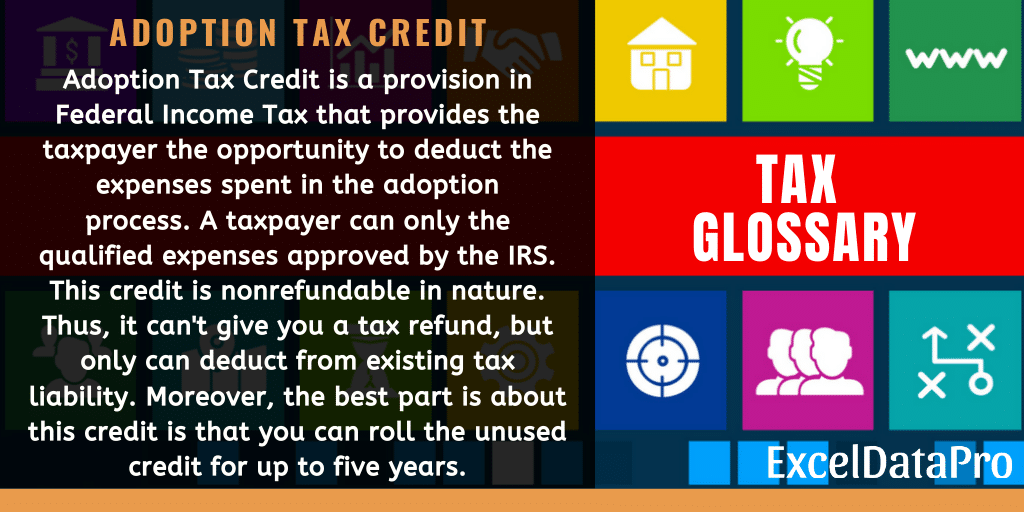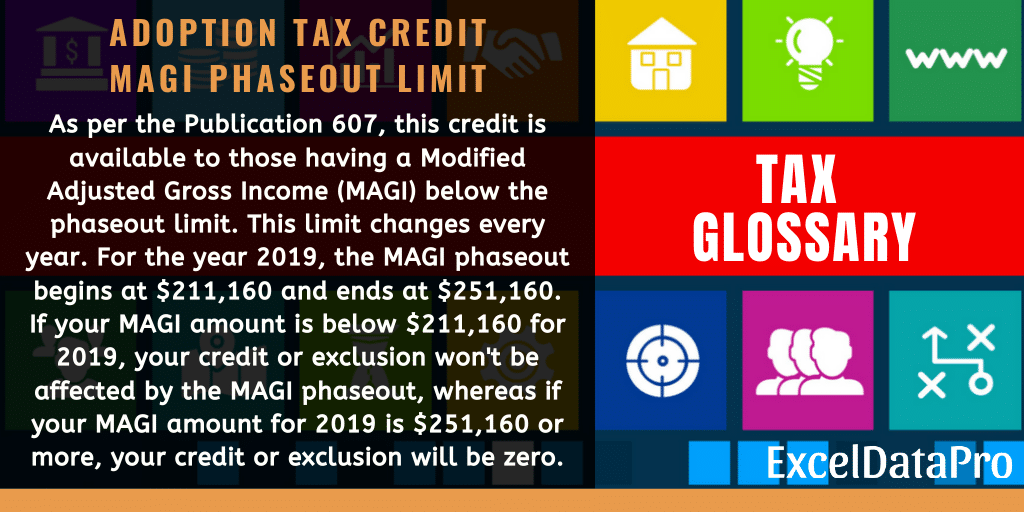
Table of Contents
Adoption Tax Credit – Definition
Adoption Tax Credit is a provision in Federal Income Tax that provides the taxpayer the opportunity to deduct the expenses spent in the adoption process. A taxpayer can only the qualified expenses approved by the IRS.
This credit is nonrefundable in nature. Thus, it can’t give you a tax refund, but only can deduct from existing tax liability. Moreover, the best part is about this credit is that you can roll the unused credit for up to five years.
Adopting a is not an easy job. It is often a difficult and expensive process. This credit is a boon for parents planning to adopt a child. It helps decrease the financial burden of adopting a child.
Eligibility for Adoption Tax Credit
The first and foremost criteria for claiming the credit is that the parent must adopt an eligible child and have paid the eligible expenses.
MAGI Phaseout Limit
As per the Publication 607:
The adopter must be a registered domestic partner who lives in a state. It also includes legally registered same-sex partners.
Eligible Child – Normal
- A child under the age of 18 who is a U.S. citizen or resident (including U.S. territories) or a non-US citizen when the adoption process starts.
Eligible Child – Special Needs
- The child is a U. S. citizen or resident when the adoption effort begins.
- A child whom the state determines that he/she can’t or shouldn’t be returned to his/her parent’s home.
- A child whom the state determines that he/she probably won’t be adoptable without assistance to the adopting parent.
Eligible Expenses
According to Section 23(d)(1) of the Code, qualified adoption expenses include:
- Reasonable and necessary adoption fees.
- Costs incurred for Court process as well as attorney fees.
- Traveling expenses during the purpose of finding and finalizing the process of adoption. Includes money spent on food, lodging, etc.
- Other expenses directly related to the purpose of the legal adoption of an eligible child.
Important Note: Any expense paid even before an eligible child has been identified can be included in qualified adoption expenses. For example, prospective adoptive parents paying for a home study for an adoption purpose.
Expenses paid by a taxpayer to adopt his spouse’s child do not qualify for Adoption Credit.
Adoption Tax Credit Limit
The adopting parents can claim a total amount of expenses up to $ 14,080. The IRS adjusts the amount of credit utilized in the previous year’s tax filing. If a couple claims $ 2,000 in 2018, then $ 12,080 will be available for credit in 2019 or at the time of finalizing adoption.
For Eligible Child
For a normal eligible child, you can claim actually spent qualified expenses up to $ 14,080. These expenses can be claimed in the next year preceding the expense year and the MAGI limit is also applicable. For example, the money spent in 2017, can be claimed in 2018.
For Eligible Special Needs Child
Adopting an eligible special needs child the couple is eligible for the maximum amount of $ 14,080 credit in the year of finality.
Time Rules For Adoption Tax Credit
There are some timing rules applicable to claim the adoption credit. The tax year for which you can claim the credit depends on the following:
- When the expenses are paid.
- Whether it’s a domestic adoption or a foreign adoption; and
- When, if ever, the adoption was finalized.
For Domestic Adoption
In the case of domestic adoption, the expenses paid before during a particular year can be claimed in the following year of payment. These expenses are claimable even if the adoption has not finalized or even an eligible child is not identified.
For Foreign Adoption
In the case of foreign adoption, expenses paid before and during the year can only be claimed in the year when it becomes final.
Filing Status of Adopting Couple
Filing status plays an important role while taking benefit of the adoption credit. The filing status of the couple adopting must keep their status as Couple Filing Jointly.
If a couple has already filed a return using the married filing separately filing status in the year of claiming this credit will require to file an amended return and change to Filing Jointly.
Furthermore, a couple filing a return separately can claim only if all the following conditions apply:
- Statements (2) and (3) under Who Can Take the Adoption Credit or Exclude Employer-Provided Adoption Benefits are true.
- You lived apart from your spouse during the last 6 months of adoption year.
- The eligible child lived in your home for more than half of the adoption year.
- You provided for over half the cost of keeping up your home.
For example, a couple pays qualified adoption expenses of $2,000 in 2017, $3,000 in 2018, and $6,000 in 2019. In 2019, the domestic adoption becomes final. For the years 2017 and 2018, they have filed a return.
As per the law, in 2019 they file the tax return with status married filing jointly. They will be eligible to claim only $9,000. Adoption expenses $3,000 of 2018 and $6,000 of 2019. Hence, as they previously filed separately in 2018, the $2,000 amount paid in 2017 is not claimable.
To claim the adoption credit use Form 8839 and will have to submit along with your Federal Tax Return.
Additionally, you can download Federal Income Tax Excel Templates like Itemized Deductions Calculator, Schedule B Calculator, Child Tax Credit Calculator from our website.
We thank our readers for liking, sharing and following us on different social platforms.
If you have any queries please share in the comment below. We will be happy to assist you.

Leave a Reply